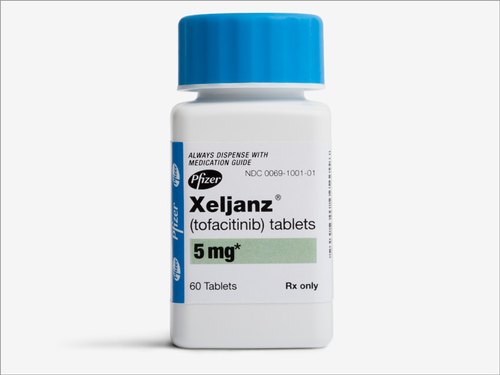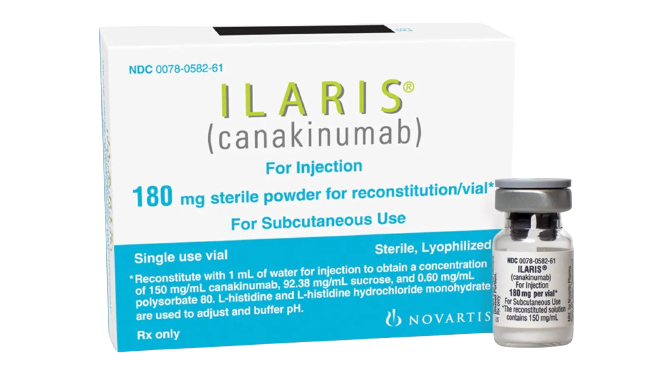Xeljanz (tofacitinib) vs Ilaris (canakinumab)
Xeljanz (tofacitinib) vs Ilaris (canakinumab)
Xeljanz (tofacitinib) is a Janus kinase inhibitor that is commonly used to treat rheumatoid arthritis, psoriatic arthritis, and ulcerative colitis by modulating the immune system to decrease inflammation. Ilaris (canakinumab) is a monoclonal antibody that targets interleukin-1 beta, a cytokine that plays a role in various inflammatory diseases, and is used for conditions such as Cryopyrin-Associated Periodic Syndromes (CAPS), Systemic Juvenile Idiopathic Arthritis (SJIA), and gout flares. When deciding between Xeljanz and Ilaris, it is crucial to consider the specific condition being treated, the patient's overall health, potential side effects, and the mechanism of action of each medication, as their suitability may vary depending on the individual's unique medical circumstances.
Difference between Xeljanz and Ilaris
| Metric | Xeljanz (tofacitinib) | Ilaris (canakinumab) |
|---|---|---|
| Generic name | Tofacitinib | Canakinumab |
| Indications | Rheumatoid arthritis, Psoriatic arthritis, Ulcerative colitis | Cryopyrin-associated periodic syndromes, Systemic juvenile idiopathic arthritis, Active Still’s disease, Adult-onset Still’s disease, Familial Mediterranean fever, Hyperimmunoglobulin D syndrome, Tumor necrosis factor receptor associated periodic syndrome |
| Mechanism of action | Janus kinase (JAK) inhibitor | Interleukin-1β (IL-1β) blocker |
| Brand names | Xeljanz, Xeljanz XR | Ilaris |
| Administrative route | Oral | Subcutaneous injection |
| Side effects | Upper respiratory tract infections, Headache, Diarrhea, Nasopharyngitis | Infections, Vertigo, Injection site reactions, Nausea |
| Contraindications | Severe liver disease, Active serious infections | Active infections, Hypersensitivity to canakinumab or excipients |
| Drug class | JAK inhibitor | Monoclonal antibody |
| Manufacturer | Pfizer | Novartis |
Efficacy
Xeljanz (Tofacitinib) Efficacy in Rheumatoid Arthritis
Xeljanz (tofacitinib) is an oral medication that belongs to a class of drugs known as Janus kinase (JAK) inhibitors. It is approved by the U.S. Food and Drug Administration (FDA) for the treatment of adults with moderately to severely active rheumatoid arthritis (RA) who have had an inadequate response or intolerance to methotrexate. The efficacy of Xeljanz in treating RA has been demonstrated in several clinical trials. These trials have shown that tofacitinib can reduce signs and symptoms of RA, improve physical function, and inhibit the progression of structural damage in patients with RA.
In clinical studies, Xeljanz has been found to be effective both as monotherapy and in combination with nonbiologic disease-modifying antirheumatic drugs (DMARDs). The American College of Rheumatology (ACR) response criteria, which measure improvement in tender and swollen joint counts and other criteria, have been used to assess the efficacy of Xeljanz. Patients treated with Xeljanz have shown significant ACR20, ACR50, and ACR70 responses compared to placebo, indicating a 20%, 50%, and 70% improvement in RA symptoms, respectively.
Ilaris (Canakinumab) Efficacy in Rheumatoid Arthritis
Ilaris (canakinumab) is a monoclonal antibody that targets interleukin-1 beta (IL-1β), a cytokine involved in the inflammatory response. While Ilaris is primarily approved for the treatment of several rare auto-inflammatory syndromes, its efficacy in rheumatoid arthritis has been explored in clinical trials. However, it is important to note that as of the knowledge cutoff date, Ilaris is not approved by the FDA for the treatment of rheumatoid arthritis.
Despite its lack of approval for RA, research into the use of canakinumab in this condition has been conducted. In these studies, canakinumab has been evaluated for its potential to reduce the signs and symptoms of RA, as well as its safety profile. The results from clinical trials have provided insights into the potential benefits of targeting IL-1β in RA patients, particularly in those who have not responded adequately to other treatments. As with any investigational use, more research would be needed to fully understand the efficacy and safety of Ilaris in the context of rheumatoid arthritis before it could be considered for approval for this indication.
Regulatory Agency Approvals
Xeljanz
-
European Medical Agency (EMA), European Union

-
Food and Drug Administration (FDA), USA

-
Health Canada

-
Therapeutic Goods Administration (TGA), Australia

Ilaris
-
European Medical Agency (EMA), European Union

-
Food and Drug Administration (FDA), USA

Access Xeljanz or Ilaris today
If Xeljanz or Ilaris are not approved or available in your country (e.g. due to supply issues), you can access them via Everyone.org.
How it works

Make an enquiry
Choose the medicine you want to buy, answer a couple of questions, and upload your prescription to speed things up. We’ll get back to you within 24 hours.


Make an enquiry
Choose the medicine you want to buy, answer a couple of questions, and upload your prescription to speed things up. We’ll get back to you within 24 hours.


Breeze through the paperwork
We'll guide you through the required documents for importing unapproved medicine, ensuring you have all the necessary information.


Get a personalized quote
We’ll prepare a quote for you, including medicine costs and any shipping, administrative, or import fees that may apply.


Receive your medicine
Accept the quote and we’ll handle the rest - sourcing and safely delivering your medicine.

Some text on this page has been automatically generated. Speak to your physician before you start a new treatment or medication.
Let's talk
If you have any questions, call us or send us a message through WhatsApp or email:
Contact us




